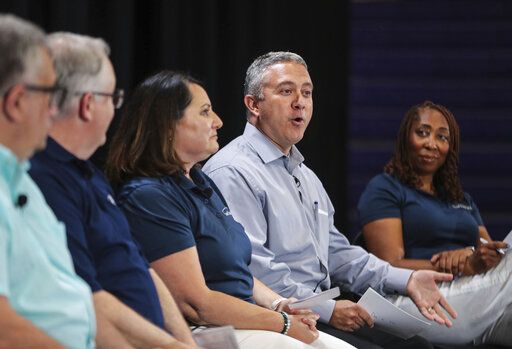Ford pledges to work with community near future factory
Dave Nowicki and other Ford Motor Co. team members speak during a panel discussion on the automaker’s planned electric truck factory, at Haywood High School, Tuesday, June 21, 2022, in Brownsville, Tenn. They pledged to be good neighbors to people that live nearby to the future electric truck factory, which will create thousands of jobs. (Patrick Lantrip/Daily Memphian via AP)
BROWNSVILLE, Tenn. (AP) — Ford Motor Co. officials on Tuesday pledged to be good neighbors to those in rural west Tennessee who live near the automaker’s planned electric truck factory, a project expected to create thousands of jobs and change the face of the region.
More than 200 people attended a panel discussion at a high school in Brownsville, one of many communities that will likely be affected by Ford’s $5.6 billion project to build electric F-Series pickups at a 3,600-acre (1,460-hectare) parcel of land known as the Memphis Regional Megasite in Haywood County.
The project, called BlueOval City, is a joint venture with SK Innovation, which will build battery factories at the Tennessee site and in Glendale, Kentucky. In west Tennessee, the project is predicted to boost the economies of several counties. Ford plans to employ about 5,600 workers at the plant, while construction of the factory and the arrival of Ford suppliers will create thousands more jobs.
The project is expected to bring both small and large businesses to the area, including hotels, restaurants, health care facilities and others. Real estate values also could increase. But some residents have expressed concern that those changes could be accompanied by increased road traffic, noise, crime and other issues.
Panelists presented a collective friendly face and discussed subjects ranging from workforce development to environmental issues to philanthropy. Ford officials said they were eager to hear from and work with residents to make the project a source of community enrichment.
“As we embark on the journey together, it is our commitment that Ford will be a good neighbor,” said Dave Nowicki, director of manufacturing, battery and electric vehicles,
Construction on the truck factory is expected to begin later this year, but crews already have started ground leveling operations at the site. Ford has said it plans to start production by 2025.
Entities with ties to the project already have started preparing. The Tennessee Valley Authority is building an electric substation and nearly 10 miles of transmission line to provide power for the site and surrounding area. A board that oversees the Megasite has met to discuss issues related to the environment. And, the Transportation Security Administration will be resuming service to a regional airport in Jackson, about 40 miles away from the site, in anticipation of an increase in travelers.
Ann McCormick, the project’s environmental and sustainability manager, said Ford has studied the area’s waterways and wetlands, in addition to an aquifer that provides water to homes and business. Ford has developed a pollution prevention plan to protect water resources at the site and “mitigate any impacts that construction could have.”
Since the announcement of the project last year, some residents have wondered if towns such as Brownsville and Stanton, where the factory will be built, are ready for changes it will bring to their normally quiet, rural communities.
Brownsville resident Jim Miller, 75, said he’s thought about how the project will affect his town of about 9,800 people.
“I can see it exponentially growing. Whether Brownsville is ready for that, that’s the question,” Miller said. “You can’t let it overwhelm the culture and history of this area. It’s a fine line you got to walk.”
Copyright 2022 The Associated Press. All rights reserved.


